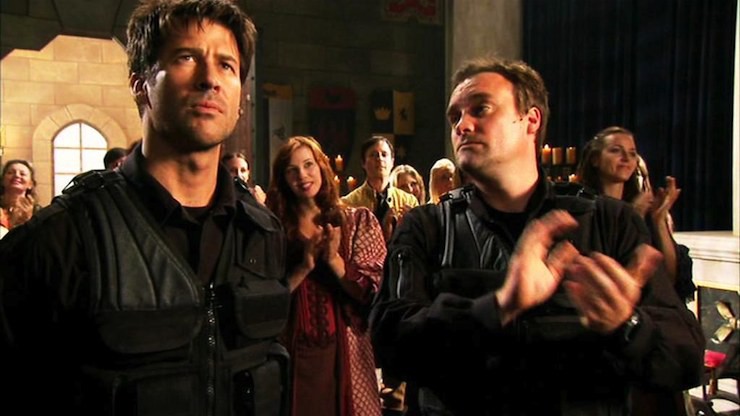Stargate Atlantis Season 4
Executive producers: Robert C. Cooper, Brad Wright, Joseph Malozzi, Paul Mullie
Original air dates: September 28, 2007 – March 7, 2008
Mission briefing. Atlantis is drifting between star systems, with McKay and Zelenka trying desperately to keep everyone from dying through various manipulations of the power and the shield. Meanwhile, Weir is dying, and the only solution that Keller can come up with involves activating the nanites that are still in her system. Sheppard thinks this is a terrible idea, but they do it anyhow, as she’ll die otherwise. Weir herself thinks it’s a bad idea when she’s revived.
The city needs a ZPM or they’ll be drifting forever, but they have a jumper that can make it to a planet—specifically, the Asuran homeworld. Weir is now plugged into the replicators, so she helps them get the ZPM, and also keeps Oberoth at bay. But in the end, she is taken by the replicators, even as the others escape with a ZPM.
As an added bonus, McKay has altered the replicator base code so that they will do what the Ancients originally built them for: to fight the Wraith. A Wraith-replicator war proceeds to break out in the Pegasus galaxy.
Apollo searches for the city, aided by Carter and Lee, who were getting Midway Station ready for operation at the center-point between galaxies. Eventually, they find them, and Carter and Lee help land Atlantis on a new world. With Weir MIA, Carter is put in charge of the expedition, to the chagrin of McKay, who thought he was a shoo-in for the job, and of Ronon, who has been reunited with some Satedan friends who claim to have been raiding the Wraith. However, it turns out that they’re Wraith worshippers, and they lead the team into a trap, one that Carter has to rescue them from.
Despite the bad end to trying it on Weir, the notion of nanites being used for medical purposes is explored back on Earth. Unfortunately, a civilian learns of the experiments, and kidnaps first McKay’s sister, then McKay himself when he, Sheppard, and Ronon come to Earth to try to find her. He wants to use the nanites to help his dying daughter. They are unable to save her, although one of the aforementioned researchers has succeeded in creating two humanform replicators that are set loose on Earth until Sheppard and Ronon are able to capture them.
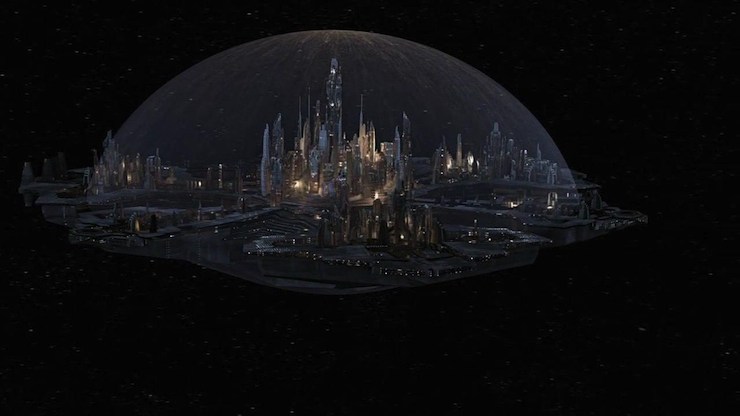
Carter’s past experiences prove useful when Sheppard encounters a crystalline life form similar to the one SG-1 encountered in “Cold Lazarus,” though not in time to save Heightmeyer, who is killed by the creature. Meanwhile, the city is ravaged by a disease that is native to the galaxy—and which Ronon and Teyla are immune to—and that takes away everyone’s memories, which complicates matters.
Sheppard is kidnapped by an itinerant group of humans called Travelers, who live in kitbashed ships, and who become allies.
The replicators have decided that the best way to defeat the Wraith is to exterminate their food supply, to wit, the human population of the Pegasus galaxy. Faced with so great a threat, Atlantis (including both capital ships, Apollo and Daedalus), the Travelers, and Todd and his allies among the Wraith, team up to defeat the replicators using a plan of McKay’s that actually works.
In addition, Niam’s group of rebel replicators are still trying to find ways to ascend—and Weir has become part of their group. They are the only replicators who survive the destruction of their homeworld.
With the replicators no longer a factor, the Wraith once again become the main bad guy in Pegasus, and the war with them heats up, with Atlantis salvaging a damaged hive ship and also destroying a cloning facility. Meanwhile, the Wraith figure out a way to access the gate bridge, and invade Earth via Midway Station, though they are stopped by Ronon and Teal’c. Midway itself is destroyed, rendering the gate bridge useless.
The Genii continue to be pains in the ass, as they are hired to kill the heir to a throne—whom McKay and Sheppard have been commissioned to protect—and an old mine of theirs nearly gets Carter, McKay, and Keller killed.
The Athosians are kidnapped by Michael, and Teyla spends a great deal of time trying to find them, especially since one of the missing Athosians is the father of her unborn child. Unfortunately, when she does find them, she is kidnapped by Michael, who wants to make use of Teyla’s unborn child for his own experiments—and he’s been experimenting on the Athosians, too. On top of that, Michael has also cloned Beckett, and has been using that clone (who thinks he’s the original) to aid in his experiments.
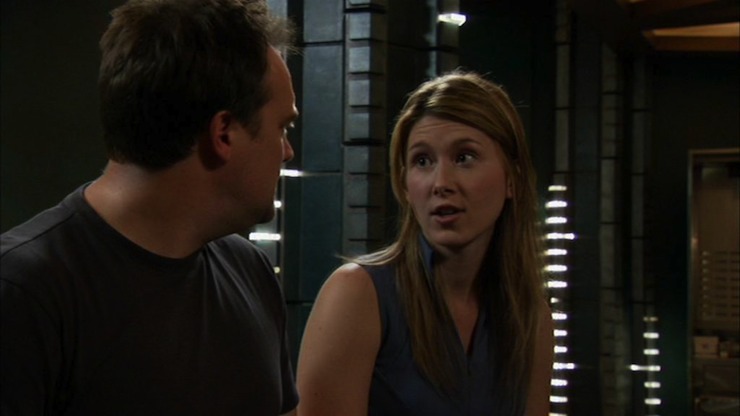
At the end of the season, the Beckett clone is dying and in stasis, Teyla has been kidnapped by Michael, and Sheppard is sent 48,000 years into the future by a solar flare, where an interactive hologram of McKay tells him how everyone died (horribly, mostly), and they work to go back in time and fix it.
Best episode: “Adrift” and “Lifeline.” These two episodes combine nicely with “First Strike” to form a three-parter that’s even stronger than “The Siege” bridging seasons 1 and 2. Atlantis is at its best when the characters are faced with a crisis that they have to think their way out of, and sometimes the tricks they have up their sleeves don’t always work, or have unexpected consequences. These two episodes are classic cases of that, from using the jumpers to stop the asteroids from damaging the station to Sheppard and Zelenka’s space-suit walk-and-jump to repair the crystals to the reduction of the force field to the spectacular, multilayered confrontation between Weir and Oberoth. With regards to that last, this is also the only one of David Ogden Stiers’s appearances as Oberoth that’s actually worthy of an actor of Stiers’s considerable caliber, as he is magnificent.
Runners-up: “Reunion,” a good use of Ronon, a good introduction of Carter to her new job, and a solid actioner. “Tabula Rasa,” a spectacular horror piece, as details are revealed to the viewer slowly and effectively disjointedly, with everyone’s reaction to amnesia making for some magnificent chaos. “Be All My Sins Remember’d,” a slambang climax to the replicator arc, with a thrilling collaboration among Atlantis, Todd, and the Travelers. “Midway” is pure fan service, but it’s good fan service, as pairing Teal’c and Ronon is huge fun. Also fun is “Harmony,” which is pretty much an Atlantis version of “The Ransom of Red Chief.”
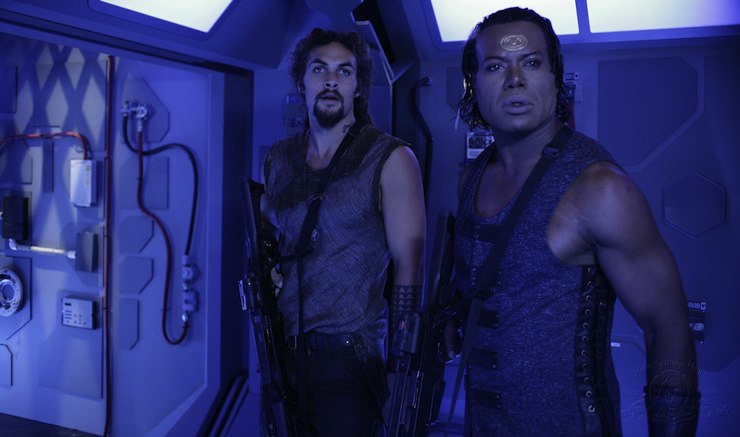
Worst episode: “Trio.” Just a tiresome slog of an episode, in which Carter acts nothing like the Samantha Carter we’ve seen in every other of her Stargate appearances, and which stretches out the plot beyond all interest, coupled with a total lack of a B-plot to alleviate the boredom. It feels like a Weir-McKay-Beckett story from seasons 1 or 2 hastily rewritten to accommodate Carter and Keller without actually getting it right. (I was stunned to see that co-executive producer Martin Gero wrote this one.)
Runners-up: “This Mortal Coil” feels ultimately pointless, a bait-and-switch that’s a little too reminiscent of SG-1‘s “Tin Man,” and considerably less interesting or effective. “Outcast” feels like it’s treading the same budget-saving ground as “Miller’s Crossing,” but without the Hewlett sibling banter to ameliorate it, plus we get very little by way of actual revelations about Sheppard; it doesn’t help that neither Dylan Neal nor Kari Wuhrer light the world on fire as his brother and ex-wife (Stephen E. Miller is far more effective as Pool).
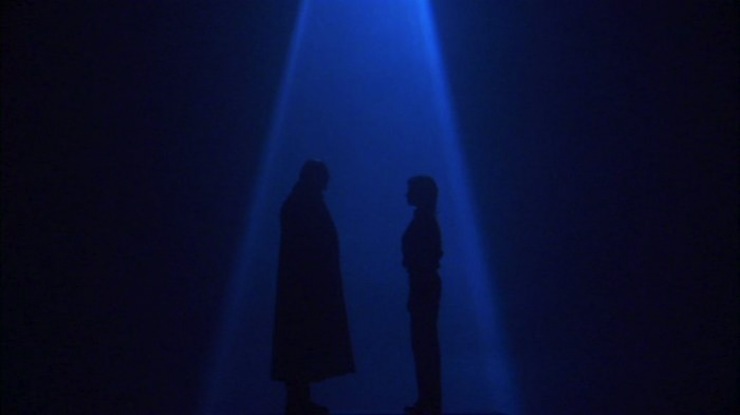
Can’t we just reverse the polarity? Apollo and Daedalus are now outfitted with Asgard beam weapons, since the flaw that the Ori could detect them with the Asgard upgrades is no longer a factor following the events of The Ark of Truth. The Asgard beam weapons prove particularly useful against both the replicators and the Wraith.
These are not the decisions I imagined making. Weir holds her own against Oberoth, and quickly becomes the leader of Niam’s rebel replicators who are attempting to ascend.
It might work, sir. Carter gets to run the show, and comports herself pretty damn well, considering that the replicators are stopped and the Wraith seriously weakened on her watch, not to mention the discovery of the Travelers and the Genii reduced to an irrelevancy. In the alternate future of “The Last Man,” she takes command of the Phoenix, a new 304 ship, and does several successful commando raids against Michael before she’s forced to do a kamikaze run against two hive ships.
Yes, but I’m also incredibly lazy. Sheppard gets himself something resembling a new girlfriend, and he and Larrin develop a hilarious banter between them. We also meet his ex-wife and estranged brother, following the death of his father.
I know everything about everything. McKay comes up with the method of getting the replicators to fight the Wraith, figures out how to stop the replicators, and creates a hologram that gets Sheppard to change history after 48,000 years.
They are good trading partners. Teyla finds out she’s pregnant around the same time that her people go missing. She then hides her pregnancy from the rest of the expedition (except for Keller, of course) for two months, leading to Sheppard epically blowing up at her for not telling him. She’s removed from active duty, though she still participates in some missions, including the search for the Athosians. In the alternate future of “The Last Man,” she’s killed (Rachel Luttrell doesn’t appear in the episode, as she was busy giving birth), and saving her life is the primary means by which Sheppard keeps that future from happening.
I was just gonna blow it up. Ronon credits Weir for saving his life, and he’s slow to warm to Carter, though her saving his ass after his friends betrayed him goes a long way toward helping out there. In the alternate future of “The Last Man,” he and Todd wind up working together to destroy one of Michael’s labs, sacrificing their own lives and sharing an ironic smile before blowing themselves up.
For cryin’ out loud! Carter has a picture of her and O’Neill fishing together in her office.
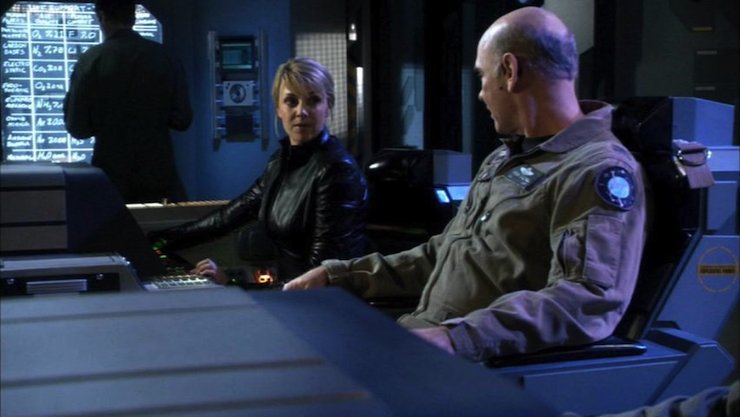
We’re in another galaxy, how much more out can we get? Before escaping Atlantis’s captivity last season, Michael obtained enough genetic material to clone Beckett—and also apparently somehow copies his consciousness. That clone believes himself to be the original (until Sheppard and the gang tell him otherwise), and is blackmailed by Michael into being his lab assistant.
Indeed. Teal’c sees Carter off in “Reunion,” and then appears again in “Midway” to coach Ronon in how to deal with the IOA. The two resident badasses get to singlehandedly foil a Wraith invasion of the SGC. Teal’c has grown his hair out even longer.
Wayward home for out-of-work genre actors. Martial arts film star Mark Dacascos shows up in “Reunion” as Tyre, while the badassiest badass in the history of badassitude himself, Danny Trejo, plays a Bolo Kai in “Missing.” Blade: The Series co-star Jill Wagner appears twice as Larrin, the leader of the Travelers. “Outcast” gives us both Sliders co-star Kari Wuhrer (as Sheppard’s ex-wife) and Blood Ties co-star Dylan Neal (as Sheppard’s brother). Recurring Star Trek: Enterprise regular Steven Culp appears in “Miller’s Crossing.” And back for more are Robert Picardo, Mitch Pileggi, Jewel Staite, David Ogden Stiers, and Connor Trinneer.
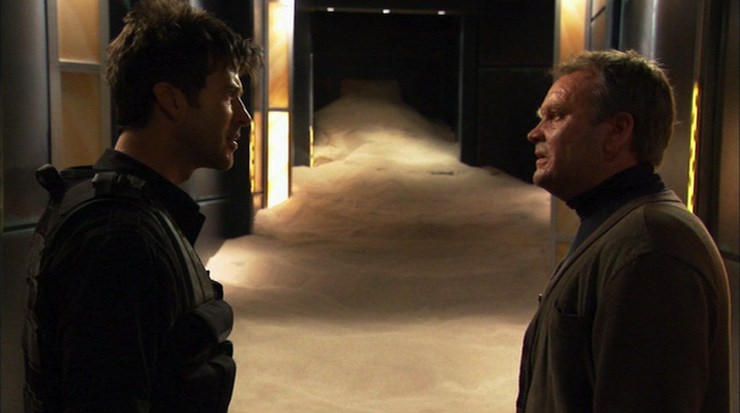
Trivial matters. Torri Higginson is no longer in the opening credits, though she guest stars in four episodes—thrice as Weir, once as a replicator duplicate of Weir created by Niam’s rebels (they re-create the entire Atlantis expedition as it was when Weir was taken by the replicators). Her role in “Be All My Sins Remember’d” was not credited until the closing credits in order to preserve the surprise of her appearance at the end with Niam’s rebels.
Amanda Tapping takes Higginson’s place as second-billed in the credits—the same spot she had for seasons 6-10 of SG-1. Because she missed part of season 9 of SG-1, she still had a year left on her contract, so she was put on the spinoff.
After appearing in “First Strike” as Beckett’s replacement Dr. Jennifer Keller, Jewel Staite becomes a recurring regular this season, appearing in eleven episodes (coincidentally, the same number that David Nykl appears in as Zelenka). Paul McGillion returns for two episodes as the clone of Beckett.
Christopher Heyerdahl continues his recurring role as Todd the Wraith (he is given that nickname during this season), and also reprises his role as the Athosian Halling in “The Kindred.” (In fact, he appears in both parts of “The Kindred,” Part 1 as Todd, Part 2 as Halling.) Brendan Penny plays Todd in “Be All My Sins Remember’d,” though Heyerdahl looped in his voice for the character’s dialogue.
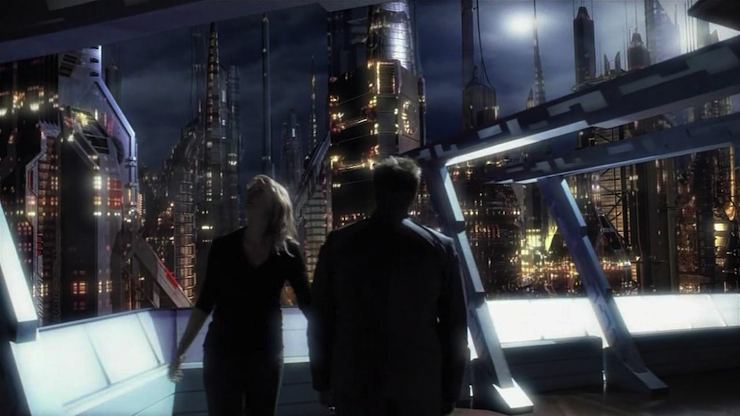
Kate Hewlett returns twice as McKay’s sister Jeannie Miller. Claire Rankin returns as Heightmeyer just long enough for the character to die in “Doppelganger.” Dean Marshall makes a welcome return as Bates (now with the NID) in “Outcast,” while Ben Cotton makes a most unwelcome return as Kavanaugh in “Midway.”
Various SG-1 folks show up (besides the aforementioned two appearances by Teal’c): Martin Christopher as Marks, Bill Dow as Lee, Peter Flemming as Barrett, and Gary Jones as Harriman.
While most of the future Sheppard was told about in “The Last Man” doesn’t come to pass, some of it still comes true, including Woolsey replacing Carter as head of the expedition, McKay and Keller’s relationship, and Carter being given command of the next 304 ship to be built, originally meant to be called the Phoenix, though it will be renamed in posthumous honor of Hammond.
Michael creates a plague based on the Hoffan drug from “Poisoning the Well.” He is also experimenting on the Athosians, continuing the work done on Teyla and others, as revealed in “The Gift.”
Teyla’s pregnancy was written in due to Rachel Luttrell’s pregnancy, thus making her the fifth female character in the franchise who had a pregnancy that needed to be accommodated, the previous four having happened on SG-1. While Amanda Tapping and Lexa Doig had reduced roles to keep them off-camera, Vaitare Bandera’s and Claudia Black’s were, like Luttrell’s, written into the show.
The hyperspace jumper used to go to the Asuran homeworld in the season premiere is based on designs McKay created when enhanced in “Tao of Rodney.”
Some fans have pointed out similarities between the Stargate and modern Star Trek franchises: starting with a show in which the characters went to a new place every week (The Next Generation, SG-1), a spinoff that took place in a single location (Deep Space Nine, Atlantis), and a second spinoff that had the cast lost in a faraway part of space (Voyager, Universe). Adding to that is that in both cases, the spinoff had someone from the first show join the cast in its fourth season (Worf, Carter).
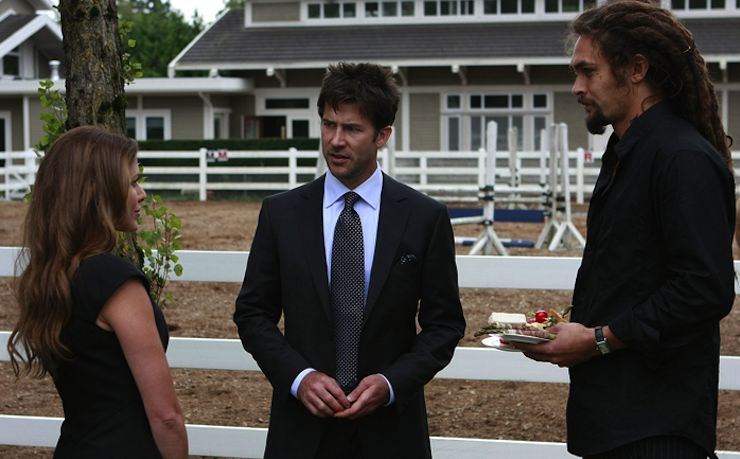
Chevron seven locked. It’s interesting, my memory of this season was that they blew a golden opportunity here. Carter is, in many ways, the perfect person to lead Atlantis, as she combines scientific knowhow—which has become the backbone of the expedition—with military prowess—vital given the Wraith and replicator threats. I remember being disappointed in how Carter was used, thinking that they marginalized her, had her not acting at all like the Carter we knew and loved, and having her actually defer to McKay more than once, which was absurd.
And it turns out? My brain had somehow decided that “Trio” was the entire season. Because the only episode where that concern was a concern was in that particular episode, in which Carter was acting more like Weir than Carter. I may also have let my annoyance with how Torri Higginson was treated color my perceptions of the season, even though I unreservedly love the character of Samantha Carter.
Remove “Trio” from the equation, and you actually have a really strong season, and a most excellent use of Carter. Unlike season 8 of SG-1, when the character was never really given much of a chance to truly be the leader of SG-1, Carter here gets to be the leader. Unlike Weir, who was ill-served to the leader-who-stays-behind role, Carter has reached the point in her career where she would be in command (just as O’Neill did in season 8 of SG-1). She still gets her hands dirty—viz., the commando raid to rescue the team in “Reunion”—and her big brain is still periodically useful, like in “Be All My Sins Remember’d.”
Mostly, though, she makes good command decisions. She shouts down Woolsey in “The Seer,” while also making several difficult choices, she handles the death of Heightmeyer with impressive dignity in “Doppelganger,” and the moment when she tears Ellis a new one for rebuking McKay in “Be All My Sins Remember’d” is a crowning moment of awesome.
Having said all that, I still miss Weir. So much potential flushed away, made worse by the promise of a really cool subplot with her at the end of “Be All My Sins Remember’d,” which isn’t picked up on until season 5, and done so poorly. At least she got to go out strong, taking on Oberoth and almost winning.

As for the rest of this season, I realized that, more than any other season of this rewatch so far, I had a hard time singling out particular episodes for praise—or for derision. This is a very solid, impressive bunch of episodes. Subplots are advanced nicely, from Michael’s experiments to the development of Todd as a reluctant ally to McKay sabotaging his relationship with Katie Brown to the mystery of the missing Athosians to the Wraith-replicator war. Losing Heightmeyer is a blow—having a shrink on the expedition was useful, and we never saw her replacement—and bringing Beckett’s clone back was cheap and tiresome, and besides, I actually prefer Keller, who develops nicely this season. But overall, this is a strong, solid season. And “The Last Man” gives us a very entertaining (if depressing) look at a possible fifth season (which, if nothing else, was more interesting than the fifth season we actually got—but we’ll look at that in two weeks…).
Keith R.A. DeCandido urges everyone to support the Kickstarter for a superhero flipbook anthology called The Side of Good/The Side of Evil, for which Keith will be writing a Super City Police Department story, and which will also have a new Furious story by Bryan J.L. Glass, as well as tales by Peter David, Jennifer K. Spendlove, Aaron Rosenberg, Robert Greenberger, James Chambers, Gail Z. Martin, John L. French, James M. Ward, Neal Levin, and Kathleen O. David. The anthology will be edited by veteran anthologist Danielle Ackley-McPhail and Between Books‘s Greg Schauer.










